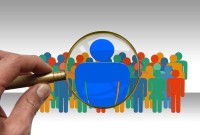- Home
- Business Processes
- Industry Knowledge
- Aerospace Industry
- Automotive Industry
- Banking Domain
- BFSI Industry
- Consumer/ FMCG Industry
- Chemicals Industry
- Engineering & Construction
- Energy Industry
- Education Domain
- Finance Domain
- Hospitality Domain
- Healthcare Industry
- Insurance Domain
- Retail Industry
- Travel and Tourism Domain
- Telecom Industry
- Leadership Skills
- eLearning
- Home
- Leadership Skills
- Leadership & Management
- Value – Key Driver of Change
Value – Key Driver of Change
Productivity is defined not in terms of the number of goods produced, but in terms of value-added per employee. Customers don’t really buy goods and services but in fact, they buy a value - something they value. The future is all about tangible products fulfilling intangible needs. Ideas like this can transform a business and provide them a competitive advantage to thrive in the future.
People Look for Intangible Benefits
People, as Theodore Leavitt pointed out long ago, don't really buy goods and services. They buy a value - something they value. The customers want the goods or services to be accompanied by intangible benefits associated with availability at the right time and place and to express the values they require.
On the weekend of the Christmas holiday, David had a breakdown with his electricity. He took a service from Urban Clap and the person diagnosed and corrected a very small fault which had put the central heating out of action, and put it right. On that day Urban Clap was not selling them a service or a spare part, they were selling peace of mind on a festival day. That is the value that was given even when it’s not needed. It’s the confidence that someone will come when David needs one.
The enterprise providing the value is able to share economics with the consumer by using as little matter as possible in the preparation of the goods or services. So automation and materials technology keep down the amount of processing and actual stuff that has to go into the provision of goods and services.
The idea of “No-Matter”
Automation and materials technology keep down the amount of processing and actual stuff that needs to go into the production and provision of services. Products will be produced more quickly and cheaply, and with less final bulk and weight. The phrase “No Matter” encapsulates all this competitive advantage and value add. 'No matter' as a concept also includes the role of the disposable, though we have to watch its impact on the environment. The idea of no matter also covers the idea of the invisible purpose behind a sale.
For example, the invisible purpose behind a drill is not the selling of drills as such, but rather to sellability to make holes. If you use a laser drill, you are very much into the realm of 'no matter', for the laser produces holes which are by definition the absence of matter. This is all a question of tangible products fulfilling intangible needs. Ideas like this can transform a business. It is all about the effectiveness of outcomes rather than the efficiency of inputs. So the physical and the intellectual blend in the marriage of the changing mindset and the future mindset.
Mass Customisation
Next is the paradoxical idea of 'mass customization'. This is providing the customer with precisely what he or she requires, such as a garment to suit a bulky or a slender frame. Providing something that is non-standard yet can be produced as goods of standard size, weight, or other requirements. The technology now permits the non-standard to be produced on the standard line. Just a change of the computerized instructions and the trick is performed. Now customers don’t want to wait for something that is made to measure.
The same technique of mass customization can be used to provide cultural variations required in various parts of the world without setting up a special production line. The mass economy provides the benefit of scale; mass customization allows for the differentiation and individualization of requirements.
Future Trends and Change
Not so long ago you can imagine how some traditional business houses would have resisted such changes in the mindset and approach. Managers today need to group the changes which have had the biggest impact on business, industry, and society. Types of technological development have to be focused on the understanding of futurology. They can no more stick to what they know we are good at and so on. There is an emerging need to approach the present from the standpoint of the future. That's how all these developments have occurred- so much so that we find it difficult to realize the amount of resistance they initially caused.
Many of these developments are at a relatively early stage, so there is much more to follow. It is essential that managers who are going to have to cope with such changes see them as a part of their functions to educate their workforces to understand the nature of the changes we can expect, of the world in which we live and the future we can create.
Related Links
You May Also Like
-
Generating Ideas using Brainstorming
The brainstorming technique was developed by Alex F. Osborn in 1957 and brainstorming means where a team of members generates a large amount of alternative fruitful ideas on a specific problem without any criticism and then evaluates each idea in terms of their pros and cons. Brainstorming techniques fall into four broad categories: visioning, exploring, modifying, and experimenting.
-
A good leadership style is something that every effective leader must have in order to succeed, but identifying what that entails or does not entails might be difficult to understand. Most of the research on leadership focuses on the exemplary, best practices, and positive attributes of effective and successful leaders. This article talks about a new approach to learn leadership using lessons from bad leadership. That is the lessons to be learned by examining leaders who have not effectively exercised their power, authority, or influence.
-
Benefits of Teams in Workplace
The use of formal work teams is commonplace in modern organizations. But why we have teams? What are the benefits or advantages that teams provide for organizations and employees? Do we really need to adopt formal team structures and use team-building approaches in organizations? Read this article to explore and learn the benefits of having formal teams in organizations.
-
Participative leadership is one of the most effective styles and creates higher productivity, better contributions from group members, and increased group morale. The democratic leadership style consists of the leader sharing the decision-making abilities with group members by promoting the interests of the group members. Learn more about this leadership style and situations when it is effective.
-
David Kolb produced this popular model for learning in 1984. The model suggests four stages of learning which most learners go through in order to learn effectively. Leaming is itself a process of change. Something is added to our perception and prepared us for the next impression, which will change our understanding yet more, however minutely. The Kolb contribution is a significant one because it practically equates change and learning.
-
Tools for Developing Your Team
If a manager has too many weak spots in the talent of the team, the ability to empower the team members to independently execute the project is impaired. Assignments fall behind schedule or stretch out because the needed skills or knowledge are not in place when needed. To successfully execute important projects, hiring talented people, and increasing the talents of existing staff are most important.
-
Communication has as its central objective the transmission of meaning. The process of communication is successful only when the receiver understands an idea as the sender intended it. How does a message or an idea travel from one person to another? To transmit our message, we engage in a sensitive and complex process of communication, with different elements like sender, message, channels, receiver, noise, and feedback.
-
Change & Culture of Innovation
Predicting the future is a tricky business but managers need to have a future perspective in order to take business advantage and remain competitive. They need to drive and introduce constructive change to the business of the enterprise. The first step to creativity and innovation is to drive a culture of Innovation. Managers need to focus on developing future mindset all the time to keep pace with the unfolding future.
-
Productivity is defined not in terms of the number of goods produced, but in terms of value-added per employee. Customers don’t really buy goods and services but in fact, they buy a value - something they value. The future is all about tangible products fulfilling intangible needs. Ideas like this can transform a business and provide them a competitive advantage to thrive in the future.
-
Crisis leadership is a very important part of leading in today's world. The skills a leader needs in order to guide people during a crisis are different from the skills needed to help a group grow. Are you a good crisis leader? What is your leadership style in case of a business crisis situation? A business crisis can test the strongest of leaders, read this article to explore how to ensure you’re ready to take action and weather the storm when one strikes you.
Explore Our Free Training Articles or
Sign Up to Start With Our eLearning Courses

About Us
Learning
© 2023 TechnoFunc, All Rights Reserved










